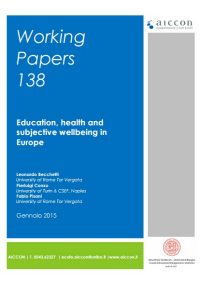138 – Education, health and subjective wellbeing in Europe
Abstract
The productive and allocative theories predict that education has positive impact on health: the more educated adopt healthier life styles and use more efficiently health inputs and this explains why they live longer.
We find partial support for these theories with an econometric analysis on a large sample of Europeans aged above 50 documenting a significant and positive correlation among education years, life styles, health outputs and functionalities.
We however find confirmation for an anomaly already observed in the US, namely the more educated are more likely to contract cancer. Our results are robust when controlling for endogeneity and reverse causality in IV estimates with instrumental variables related to quarter of birth and neighbours’ cultural norms.
Keywords: health satisfaction, education, life satisfaction, public health costs.
JEL numbers: I21 Analysis of education; I12 Health Behavior; I31 General welfare, wellbeing

